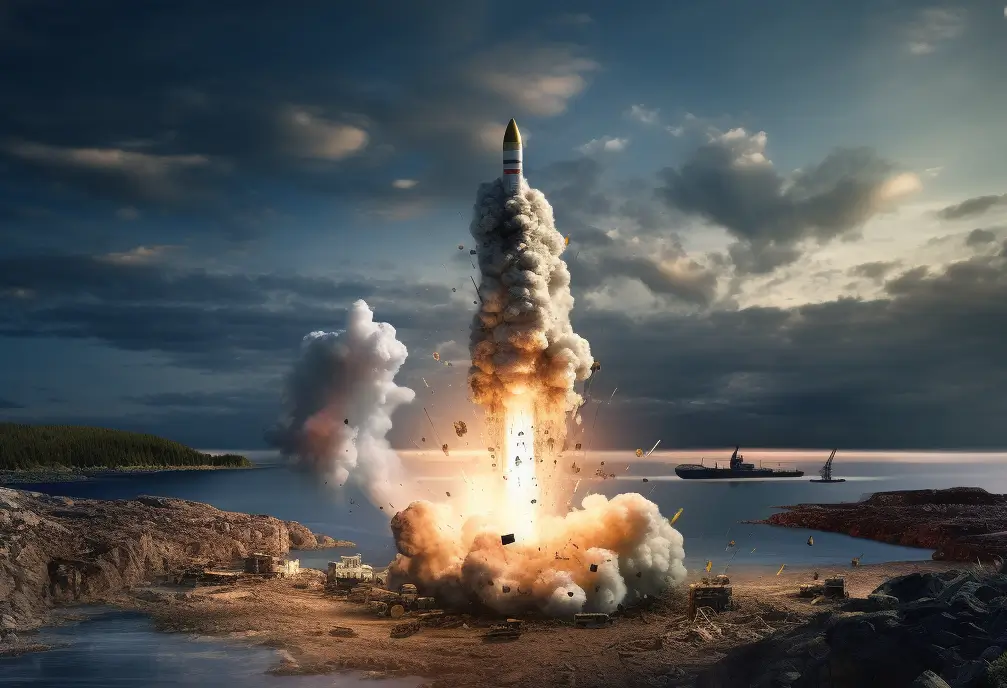It's strange that the debate about nuclear weapons is not being held in Sweden. Given the increased tension and uncertainty in international relations, especially related to Russia's aggressive actions in the region, the argument for a Nordic nuclear capability might seem like a rational deterrent strategy. Russia is a threat to Northern Europe. They have conducted hybrid warfare against Europe for 10 years and continue with sabotage against data and energy lines, in addition to propaganda to destabilize the American and Western world order.
In a time where traditional security guarantees are being re-evaluated, with examples such as the USA's varying commitment to NATO and Russia's increased military activity, nuclear weapons can be seen as a crucial factor for deterrence. Nuclear weapons have a unique ability to deter state actors from military aggression through the mutual assured destruction they entail. For Sweden and the Nordics, bordering or being close to Russia, this could be a significant factor in maintaining regional stability. Nuclear weapons could provide a form of security guarantee that compensates for the absence of full NATO membership. For Sweden and the Nordics, having their own nuclear arsenal could increase their weight on the international stage, especially in negotiations related to security and defense issues.
Deterrence against Russia?
Russia's foreign policy and military ambitions, especially considering the situation in Ukraine, have created concern in many European countries. However, it is important to analyze the specific threat picture against Sweden and the regional security dynamics.
The assessment of the Swedish Supreme Commander (ÖB) of Russia's military forces, especially its naval, air force, and strategic nuclear forces, is central to Sweden's defense planning. Despite the losses in Ukraine, Russia maintains significant military capability, which is an important factor to consider in the development of a defense strategy.
There are few military assessors who believe that Russia would invade Sweden, but during an attack on the Baltic states, would Gotland could become exposed. With the island as a base, one can dominate the Baltic Sea and control communications at sea and in the air. But during the Cold War, the Soviet Union had put a great effort into developing invasion maps of Sweden. As late as 1987, such plans existed and previously it was believed that they could be landed on Värmdö in Stockholm. according to the deceased Russia expert Leif Kihlsten.
The Russian politician Sergey Karaganov has publicly advocated for the limited use of nuclear weapons against specific targets in Europe, which is concerning and reflects escalating and aggressive rhetoric from Russian political figures. He has served in various advisory roles for the Russian government and is known to be involved in the formulation of Russian foreign policy and security strategy in the Valdai Discussion Club. Russia's military capability and willingness to use it against NATO countries are limited by the risk of a comprehensive conflict with the alliance. Therefore, NATO countries with stronger military defense and unity within the alliance can be seen as less likely targets.
In the vassal state of Belarus, Russia has completed the announced transport of tactical nuclear weapons, claims the Belarusian dictator Aleksandr Lukashenko. Tactical nuclear weapons are usually smaller charges that can be equipped, for example, on a conventional cruise missile, which can be carried by ordinary fighter jets. Source
The idea that a first strike can provide significant tactical advantages exists, but it must be weighed against the enormous risks and consequences involved. Kaliningrad is an important military post for Russia, equipped with advanced weapon systems, including nuclear-capable missiles. It has long been seen as a critical point in Russia's defense structure and as a potential threat to Europe, particularly in the event of escalated tensions.
The plan to increase the number of conscripts and strengthen the air defense, as well as the integration with NATO's command system, demonstrates an increased readiness and an intention to adapt Sweden's defense to the current security situation.
What happens to the U.S. commitment if the MAGA movement gets the presidency in 2024?
”You must understand that if Europe is under attack, we will never come to your aid and support” Trump told European Commission President Ursula von der Leyen in 2020, according to French EU Commissioner Thierry Breton, who was also present at a meeting at the World Economic Forum in Davos.
Source Politico
he Republican Party in the USA is infiltrated by Russia through organizations like the Heritage Foundation and the Freedom Caucus. In Sweden's NATO application, it was 18 MAGA politicians in the Freedom Caucus, which does not support uSeden and it is highly questionable whether they would support us in a conflict with Russia. Many within the MAGA movement likely see Sweden as a symbol of wakeism and global liberalism.
The foreign policy of the United States and its commitments to NATO allies and other partners have varied over time, but it is a complex process influenced by many factors, not just domestic issues.
If Donald Trump were to be re-elected as President in 2024 and again proposes a measure that involves the USA withdrawing from NATO, this would have significant consequences for the global security order. It is important to analyze the potential effects of such an event.
The U.S. withdrawal from NATO would fundamentally change the nature and capacity of the alliance. The U.S. is a central player in NATO, not only militarily but also politically and economically. An American withdrawal would reduce the alliance's overall military strength and undermine its political cohesion.
Such a measure could create a power vacuum, especially in Europe, which other major powers such as Russia and China might try to exploit. It could also lead to European countries seeking new security arrangements or increasing their own defense efforts.
A U.S. withdrawal from NATO could be seen by Russia as an opportunity to expand its influence and territorial ambitions in Europe. This could increase the risk of regional conflicts and destabilization.
A withdrawal could damage the U.S.'s global standing and credibility as a reliable ally. It could weaken the U.S.'s ability to shape international security arrangements and diplomacy.
For Sweden, and other European countries considering joining NATO or who are already members, an American exit would mean a reevaluation of their security strategies and potentially seeking alternative security arrangements.
Sweden would need to increase its own defense efforts, both conventionally and in terms of advanced defense technologies. This could mean greater investments in defense, improvements in military infrastructure and technology, and the development of new defense strategies.
Ukraine
Ukraine's struggle and the international response are indicators of the international community's stance on aggression and territorial violations. Sweden's decision should take into account the lessons from Ukraine, but also unique national circumstances such as the polarization in the USA where the MAGA movement wants to stop financially supporting Ukraine.
The difficulty of obtaining financial support from the US and the EU is another important lesson. These lessons highlight the importance of financial independence and contingency planning in the event of a potential military conflict. While Sweden traditionally has close ties to both the EU and the US, the situation in Ukraine underlines the importance of diversifying its international alliances. Seeking support and partnership beyond traditional allies can be a strategic advantage. A lesson for Sweden is the importance of having a strong and self-sufficient defense force.
Building and maintaining strategic reserve funds that can be mobilized quickly in a crisis situation is crucial. These funds can be used to cover costs related to defense, humanitarian efforts and reconstruction.
Nuclear Weapons as a Security Strategy
During the Cold War, the doctrine of mutually assured destruction (MAD) contributed to preventing nuclear conflicts between the superpowers. This principle assumes that the use of nuclear weapons by one party would lead to immediate and devastating retaliation, making a first strike unattractive for both sides.
Historically, Sweden had one nuclear weapons program between 1945-1972 and we could have been one of the first 5 nuclear weapons countries.
Acquiring nuclear weapons is a deeply complex and controversial issue. Besides the obvious security and ethical implications, there are international legal aspects to consider, such as the Non-Proliferation Treaty. Nuclear weapons can be seen as a deterrent, but also as a catalyst for increased tension and a military arms race.
Stridsgas och kemiska vapen ett alternativ till kärnvapen
Ett tänkbart alternativ till kärnvapen är stridsgas och kemiska vapen. Sverige skulle kunna producera stridsgas då vi har flera avancerade läkemedelsfabriker som skulle kunna ställa om sin produktion nästan omgående.
Även kring kemiska vapen finns det internationella juridiska aspekter att övervaga. Konventionen om kemiska vapen (CWC), som Sverige ratificerade 1993, förbjuder produktion, lagring och användning av kemiska vapen. Det är en omfattande global överenskommelse som syftar till att eliminera en hel kategori av massförstörelsevapen. Rysslands partner Nordkorea har varken undertecknat eller ratificerat konventionen och är en av få stater som står utanför detta globala fördrag.
Worst case scenario: that the MAGA movement takes power in 2024
The 2024 American election and trust in the USA are wavering due to their enormous budget deficit. If the scenario of the USA withdrawing from NATO and thus a reduction in the nuclear umbrella it offers becomes a reality, Sweden would face a series of difficult decisions.
Without the nuclear protection offered by NATO, Sweden may consider strengthening or forming new regional security alliances, especially with the United Kingdom. Collaboration with Nordic and European countries could be intensified to create a more coordinated and effective defense.
Acquiring nuclear weapons is an extremely complex and controversial measure. It goes against international agreements that Sweden is a part of, such as the Non-Proliferation Treaty (NPT), and would fundamentally alter Sweden's international standing. Furthermore, developing and maintaining nuclear weapons capability entails enormous economic, technical, and ethical challenges.
The availability of plutonium is only one part of the equation. The development of nuclear weapons requires significant technical expertise, infrastructure, and internationally isolating political decisions.
Finally, in all scenarios, more of Sweden's GDP needs to be invested in defense.
As a realpolitik assessment, Sweden should consider all these factors carefully. A unilateral move towards nuclear weapons can have profound consequences for the country's international standing, security alliances, and long-term stability in the region.
The ability to reach long-distance targets with drones, submarines, aircraft, and robots can be a crucial part of a national defense strategy. It provides flexibility in addressing potential threats and can serve as a deterrent against aggressive actions.
Sweden's geographical proximity to St. Petersburg, one of Russia's largest cities and a crucial strategic point, offers several opportunities to enhance our geopolitical position. A strong defense capability, including maritime and air defense capacities, can contribute to maintaining a security balance in the Baltic Sea region. This may involve cyber capabilities as well as surveillance of air and sea traffic and electronic intelligence gathering. A strategic plan for rapid response to potential military threats is essential. Considering the significance of the Baltic Sea, Sweden can bolster its maritime capacity to secure vital sea routes and deter aggressive actions in these waters.
Historically, nuclear possession has been a path to increased international influence. For Sweden and the Nordic countries, having their own nuclear arsenal could potentially enhance their significance on the international stage, especially in negotiations related to security and defense matters.
It is crucial to engage in diplomacy, pursue collective security arrangements, and adhere to international norms and agreements. A balanced, pragmatic approach that considers both immediate threats and long-term strategic objectives is essential.
Furthermore, there is an ethical dimension to consider. Nuclear weapons are the most destructive weapons humanity has created, and their use would have catastrophic humanitarian and environmental consequences. Promoting nuclear proliferation could also increase the risk of these weapons ending up in volatile regions or in the hands of non-state actors.
In summary, while the argument for a Nordic nuclear capability may seem logical from a purely strategic perspective, the political, legal, economic, ethical, and moral consequences must be carefully considered. The current international order is undoubtedly evolving, but the response to these changes requires a balanced and thoughtful strategy that takes into account both security needs and long-term global commitments.




